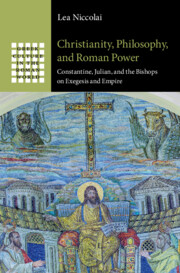 Christianity, Philosophy, and Roman Power
Christianity, Philosophy, and Roman Power Book contents
- Christianity, Philosophy, and Roman Power
- Greek Culture in the Roman World
- Christianity, Philosophy, and Roman Power
- Copyright page
- Dedication
- Epigraph
- Contents
- Figures
- Preface
- Acknowledgements
- Abbreviations, Editions, and Translations
- Introduction
- Part I At Constantius’ Court: Julian Caesar
- Part II Making and Breaking Constantine: Julian Augustus
- Part III After Julian: Philosophy in the World
- Conclusions
- Bibliography
- Subject index
- Index Locorum
Conclusions
Published online by Cambridge University Press: 07 July 2023
- Christianity, Philosophy, and Roman Power
- Greek Culture in the Roman World
- Christianity, Philosophy, and Roman Power
- Copyright page
- Dedication
- Epigraph
- Contents
- Figures
- Preface
- Acknowledgements
- Abbreviations, Editions, and Translations
- Introduction
- Part I At Constantius’ Court: Julian Caesar
- Part II Making and Breaking Constantine: Julian Augustus
- Part III After Julian: Philosophy in the World
- Conclusions
- Bibliography
- Subject index
- Index Locorum
Summary
My research began in 2016 with a seemingly simple question: how did the Christianisation of the Roman Empire affect the self-representation of Roman power? As I chased down self-referential statements in the writings of emperors and bishops, I became increasingly aware that how fourth-century leaders spoke of themselves was indissolubly tied to how they spoke of their culture. Negotiating the value of traditional Greco-Roman paideia and its literature(s) – attacked, upheld, manipulated, and fetishised – was an obsession in all the texts I was interrogating. Students of the fourth century often contemplate the puzzling fact that the cultures and practices cultivated for centuries across the Greco-Roman Mediterranean were willingly pushed aside in the space of a few decades. This book has addressed this issue through an analysis that is both culture- and power-centred and grounded on three statements, the first two of which might seem contradictory
- Type
- Chapter
- Information
- Christianity, Philosophy, and Roman PowerConstantine, Julian, and the Bishops on Exegesis and Empire, pp. 302 - 307Publisher: Cambridge University PressPrint publication year: 2023


